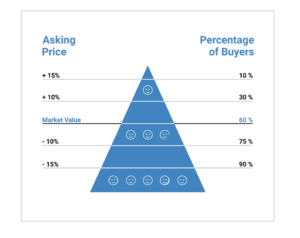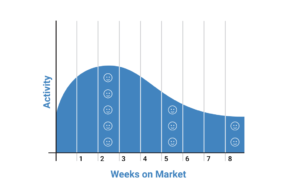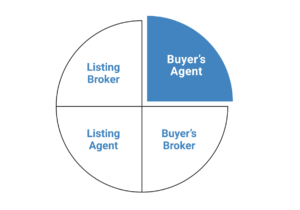FAQ
Given the proliferations of services that help home buyers and sellers complete their own transaction, you may have considered whether you should go it yourself instead of working with an agent. However, there is no substitute for an experienced professional, and taking on all the responsibility yourself could be costlier than an agent’s commission in the long run.
According to the National Association of Realtors’ 2017 Profile of Home Buyers and Sellers, only 8% of home sales were accomplished as for sale by owner (FSBO), and of those, 40% knew their buyer personally. FSBO home sales had a median price of $190,000 in 2017, compared to the agent assisted home sale median price of $250,000.
Beyond the price advantage of using an agent, homes listed by real estate professionals get more exposure and their sellers get more support.
Here are some other considerations:
- They’re trained and licensed professionals.
- They have experience in your neighborhood and your market.
- They have oversight from brokers and state licensing officials.
- Their job is to advise you the best way to reach your goals.
- They know how to present your home and deal with buyers.
- They know how and where to market properties effectively.
- They know how to overcome typical snags that occur in real estate transactions and closings.
- They understand state-required disclosures and look out for your best interests.
- They understand personal safety and security for your belongings during showings.
- They know the best resources to make transactions go more smoothly, from bankers to home-stagers to contractors.
- They have access to the most accurate and comprehensive data – the MLS, the only data repository that has the most up-to-date listing and sales information.
- They know how to negotiate.
- Their job is making real estate transactions successful.
- Their continuing education keeps them up-to-date on housing issues.
With a real estate professional in your corner, you’ll have a partner by your side to advocate for you and advise you through the entire home sale process.

Pricing a home for sale is as much art as science, but there are a few truisms that never change.
- Fair market value attracts buyers, overpricing never does.
- The first two weeks of marketing are crucial.
- The market never lies, but it can change its mind.
Fair market value is what a willing buyer and a willing seller agree by contract is a fair price for the home. Values can be impacted by a wide range of reasons, but the two biggest are location and condition. Generally, fair market value can be estimated by considering the comparables – other similar homes that have sold or are currently for sale in the same area.
Sellers often view their homes as special, which tempts them to put a higher price on it, believing they can always come down later, but that’s a serious mistake.
Overpricing prevents the very buyers who are eligible to buy the home from ever seeing it. Most buyers shop by price range and look for the best value in that range.

Intelligent Pricing and Timing Your best chance of selling your home is in the first two weeks of marketing. Your home is fresh and exciting to buyers and to their agents.
With a sign in the yard, full description and photos in the local Multiple Listing Service, distribution across the Internet, open houses, broker’s caravan, ads, and email blasts to your listing agent’s buyers, your home will get the greatest flurry of attention and interest in the first two weeks.
If you don’t get many showings or offers, you’ve probably overpriced your home, and it’s not comparing well to the competition. Since you can’t change the location, you’ll have to either improve the home’s condition or lower the price.
Consult with your agent and ask for feedback. Perhaps you can do a little more to spruce up your home’s curb appeal, or perhaps stage the interior to better advantage.
The market can always change its mind and give your home another chance, but by then you’ve lost precious time and perhaps allowed a stigma to cloud your home’s value.
Intelligent pricing isn’t about getting the most for your home – it’s about getting your home sold quickly at fair market value.
Most buyers form their first impression of your home before they even get out of the car. Curb appeal is the view from the curb that gives potential buyers the first chance to fall in love with your home. The exterior of your home should be in pristine condition – clean, cleared of clutter, with no visible repairs needed. A broken step, overgrown bush, or abandoned toys in the yard can spoil both the home’s appearance and the potential buyer’s first impression.
Here’s a simple cleanup and spruce up checklist to make sure your home leaves a stellar first impression:
- Clear driveways and walkways of weeds and debris. Repair or replace cracked steps or pavers. Whenever possible, driveways should be clear of vehicles.
- Keep your lawn mowed, edged, and watered. Prune dead branches and plants. Weed flower beds and replace leggy, thin landscaping with fresh plants and flowers.
- Replace loose or damaged roof shingles, clean the gutters, and paint and caulk window trim and doors.
- Make the front door area shine: consider repainting your front door and placing a new welcome mat. Polish the door hardware and make sure all front facing windows are clean.
- Power wash siding, brick, windows, and porches.
- Replace light fixtures -and if possible, pick new fixtures with the same mounting system to save time and hassle.
- Install new house numbers that match the finish of your light fixtures.
- Consider upgrading your mailbox; it’s an inexpensive fix and the first thing that buyers will see when they pull up to your home.
- Install flowerboxes or pots of blooming flowers for a pop of color.
- Hang a seasonal wreath from your front door.
When you list your home for sale, it becomes a product rather than your personal retreat. You want potential homebuyers to be able to envision themselves living in the home, which can be difficult if your family’s personality is still evident. Before going on market, your agent will recommend decluttering and depersonalizing, but you may also want to bring in a professional stager to help guide you through showing your home in its most marketable light.
When done correctly, staging can not only set the right emotional tone for buyers about the home, but can also help highlight the most attractive features of the home. Staging can potentially make you money, too: 77% of listing agents said a well-staged environment increases the dollar value buyers are willing to offer, according to the National Association of Realtors Profile of Home Staging. Staging can also shorten the length of time your home is on the market, with agents reporting that their staged homes were going under contract faster than those without.
A professional stager will typically begin with an in-home consultation, where they will walk through your home with you, review the property, and provide a report with their advice for the home. The report will include advice on de-cluttering, storing items, reorganizing furniture placement, and possibly changing out paint colors in different rooms. The stager may also give tips for improving curb appeal. The most common rooms that are staged are the living room, kitchen, master bedroom, and dining room.
Depending on what your home needs, and whether you want to do the work yourself or hire it done, your stager could handle bringing in supplementary furniture and décor items, manage painting or other contractors coming to your home, and have a more hands on role in getting your home ready to go on the market. The cost of services provided will vary depending how much assistance your home will need.
The vast majority of real estate agents work on commission, meaning that they are paid once the transaction closes. To simplify how commissions are routed, sales commissions are paid out of the seller’s proceeds, according to the terms of the listing agreement and/or the sales contract. Thus, the buyers’ agent commission is paid by the sellers, as a portion of their listing commission.
All commissions paid to a real estate agent have to pass through their broker; only a broker can pay a commission and only a broker can sign a listing agreement or a buyer representation agreement.

When the home is listed in the Multiple Listing Service (MLS), the listing broker discloses the terms of the commission to other cooperating brokers, so they know what compensation is offered before they bring their buyers to the listing. When the buyer’s broker presents an offer to the seller, it typically includes a provision to collect their share of the sales commission, as offered by the listing agent in the MLS.
At the closing, you will see the amount of commission being paid to each agent’s brokerage on the closing disclosure form. There will be a portion for the listing brokerage and a portion for the selling brokerage. Each agent will then be paid by their broker for whatever amount of the commission they have earned based on their compensation agreement with their brokerage.
Because agents are independent contractors, they use their portion of the commission to cover all of their business costs, including marketing, health insurance, licensing costs, business insurance, continuing education, and more.
Hire a real estate professional. A buyer’s market is not the time to represent yourself. It may be tempting to recoup some equity by not paying a real estate agent, but you’ll lose more than you’ll gain. A real estate professional can give you an accurate overview of the market, help you with strategies, and bring offers from qualified buyers.
Make your home pristine. In a buyer’s market, only location and condition can move buyers to pay more for any home. You can’t do anything about location, but you can take condition out of the equation. There’s a huge difference between a home that “doesn’t need a thing” and a home that “needs work”. Show pride of ownership by putting your home in top move-in condition so that your home is more appealing to buyers than any other home in your price range.
Price it right. You can expect lowball offers in a buyer’s market, but homes that are priced fairly and in pristine condition will be treated with more respect by buyers. If prices are falling in your area, ask your real estate professional for help. Pricing according to recent sold comparables might not be as smart as pricing to pending sales – those yet to close. You have to know what your bottom line is, but pricing your home should have nothing to do with how much you owe creditors, how much cash you need to buy your next home or how much you need for your retirement or any other reason. Buyers will only pay current or pending market value as determined by the most recent comparables.
Keep negotiations pleasant. Negotiation is a fine art, and it works best when both parties get what they want. For example, you may be willing to take less money in exchange for a cash offer or a quicker closing. Your buyer may be willing to pay your asking price, but they may ask you to pay their closing costs. You’ll quickly realize if you’re dealing with a sincere buyer. Respond to the buyer’s negotiations with documentation, receipts and other information in a timely manner. If you feel the buyer isn’t negotiating in good faith, simply stop negotiations. You’re under no obligation to respond to an unreasonable offer. The buyer will get the message.
Buyer’s markets work for sellers, too. Keep in mind that you’ll be able to take advantage of falling prices when you buy your next home. You may be able to make up for being in a tougher position on your home sale with the deal you can negotiate on your next home purchase.





